Improving health outcomes for First Nations peoples
Over the past year, we have continued to focus on new perspectives, governance and adapting curriculum frameworks.
Our new strategic plan demonstrates our ongoing commitment to a health system free of racism and discrimination by contributing to a culturally safe pharmacy workforce. One of our four strategic pillars is specifically focused on Aboriginal and Torres Strait Islander Peoples’ health.
Our role is to ensure that the public is protected by safe and accountable pharmacists. But it is more than public safety – more than ‘do no harm‘. Our work has to also be socially accountable – that is to ‘do good as well’. We view this as our responsibility, as a standard-setting body, to implement initiatives in pharmacy education that will improve health outcomes for First Nations peoples.
Ahpra states,
Cultural safety is determined by Aboriginal and Torres Strait Islander individuals, families and communities. Culturally safe practice is the ongoing critical reflection of health practitioner knowledge, skills, attitudes, practising behaviours and power differentials in delivering safe, accessible and responsive healthcare free of racism.

Reflections on our journey to embed cultural safety in pharmacist education
Step in the right direction was created to represent the journey Australian Pharmacy Council (APC) is on to embed cultural safety into pharmacy education programs in Australia, and thereby contributing to a culturally safe workforce.
The Literature Review | Embedding cultural safety in pharmacy education and assessments was released in August 2021. We examined health professional education programs and curricula in Australia, New Zealand, Canada and the USA.
We used this literature review to identify approaches to embedding cultural safety into pharmacy education in Australia. This covers:
- the impact of educational initiatives on Indigenous health
- Indigenous health curriculum framework development in Australia
- modifications of Indigenous health curriculum framework in Nursing, Midwifery and Optometry
- a review of the use of frameworks to develop and implement curriculum.
You can also watch our presentation discussing our key findings.
Bronwyn Clark, our CEO, provided her reflections on the initiative. It has been a humbling and exciting experience listening to our Indigenous Health Strategy Group members share their stories and lead us through our cultural safety conversations.
Each conversation is available on our website:
Conversation 1: Who are we here for?
Conversation 2: What do we know?
Conversation 3: What are we doing?
Conversation 4: Where do we go from here?
Launch of an Indigenous education network for pharmacy education (LIPPE)
Following the completion of the Literature Review, under the leadership of Indigenous peoples across Australia and New Zealand, APC and the Council of Pharmacy Schools Australia and New Zealand (CPS) launched the Leaders in Indigenous Pharmacy Profession Education (LIPPE) Network in May this year. We were excited to announce this new partnership with the Council of Pharmacy Schools (CPS) which will enable us to work closer together to embed cultural safety in pharmacy education and assessments. This highlights just how integral collaboration with external colleagues is to our purpose.

The artwork commissioned as part of the Literature Review continues our connection and journey and with the blessing of the artist, Sarah Richards, and maintains this natural connection to LIPPE.
The footprints at the top part of the painting again represent APC but post the literature review. They’re moving forward, applying the findings to develop appropriate curricula and assessment to ensure their graduates are able to practice in a culturally safe way and support improved health outcomes of First Nations people. This positive impact on health outcomes for First Nations people is represented by the ripples (white dots)
These footprints now represent the LIPPE image to further demonstrate our continuing journey.
We are committed to helping all Australian pharmacists deliver culturally safe care to ensure that Aboriginal and Torres Strait Islander peoples are receiving healthcare on their terms – not how western society determines it to be. We’re helping to develop a network dedicated to advancing Indigenous education in pharmacist education.
REFLECT Reconciliation Action Plan (RAP)
We officially launched our Reconciliation Action Plan in November 2021.
As Champion of this important work, Chief Executive Officer, Bronwyn Clark said,
“APC’s Reconciliation Action Plan is our tangible commitment. It provides us a strategic framework to learn from First Australians about the ongoing impacts of colonisation, to celebrate their cultures and to provide opportunities that will assist in closing the gaps between Aboriginal and Torres Strait Islander peoples and non-Indigenous Australians.”
Our RAP pillars include actions and deliverables unique to APC such as embedding cultural safety in programs for education providers. We actively engaged with staff when compiling the content for our pillars.
The pillars of a RAP are 4 concepts provided by Reconciliation Australia:
- Relationships
- Respect
- Opportunities
- Governance
Local contemporary artist, Leah Brideson completed the artwork for the RAP design. Her piece, Always Learning reflects our continual journey of learning. It symbolises unity, growth, development and the continual flow and passing of knowledge. See the meaning behind our RAP: artwork and reflections.

Aleena Williams, a Yugambeh woman, and Director of Immunisations and Notifiable Diseases, NT Health, sat on our RAP Working Group as an advisor.
“One point I’d really like to stress is I was included to the point where I wanted to be included. I never felt like I had to do anything, or that it was my responsibility to do anything. And that was really important. It’s always good to have things that you enjoy and that are meaningful to you to help you to keep going, and that’s really where I would put this experience. “ – Aleena Williams
RAP Implementation Achievements in 2021/22
August / September 2021
Launched our ‘Embedding cultural safety in education and assessments’ series of podcasts and webinars
29 September 2021
Received conditional endorsement of Reflect RAP
22 November 2021
Reflect RAP online launch (as part of the Lloyd Sansom AO lecture which was one of the webinars of the series mentioned above)
10 November 2021
Formal endorsement of Reflect RAP
December 2021- January 2022
Formed a Reflect RAP Implementation Steering Committee (RAPISC) to oversee APC’s RAP implementation & invited Aleena to be part of the
Committee as our IHSG Liaison
23 February 2022
Reflect RAPISC ToR approved by Executive
February-June 2022
Researched, selected and launched an online cultural safety training program
(IAHA Cultural Responsiveness Training) for all APC staff, Board and Committee members to complete on appointment with APC
March 2022
Participated in Closing the Gap Day
May 2022
Katrina Fanning PSM came to speak to our team at our team building day
May-June 2022
Raised awareness of National Reconciliation Week 2022 (were also meant to do painting workshop but that was moved to NAIDOC Week in July)
Our new flexible work policy includes a section about recognition of public holidays e.g. if someone does not recognise a public holiday for specific reasons such as cultural significance they may opt to substitute it with a different day
May 2022-ongoing
Undertook conversations about self-identification questions (in August 2022, after consultation with many parties, we made the decision to remove it and investigate a project with CPS/Ahpra about data collection)
Ongoing throughout the reporting period
- Standing RAP update agenda item on all APC team, Executive and Board meeting agendas
- Other ad hoc internal RAP updates
- Quarterly RAP updates for APC Committees
- Researching/selecting other cultural immersion activities for team building days
- We use Supply Nation certified businesses where possible when purchasing items


National Close the Gap day
National Close the Gap day was on Thursday 17 March. We watched a screening of Crossing the Line – A story of medical placements in remote areas challenging perspectives and self-reflection. It provided insight into the realities of providing western medical services to Indigenous communities.
First organised in 2006, Close the Gap day encourages organisations to come together to improve the health of First Nations people. It’s an opportunity for organisations and community to hold events and raise awareness of the Aboriginal health crisis, holding our governments to account on closing the gap.
Indigenous Health Strategy Group (IHSG)
We’ve partnered with Aboriginal and Torres Strait Islander and Māori peoples to ensure their voice is leading our work. The group’s advice has also been a vital component of our ongoing project to embed cultural safety in pharmacy education.
The IHSG was established by the APC Board.
Our high-level objectives are to:
- provide a culturally safe pharmacist workforce for all Indigenous peoples of Australia and New Zealand
- provide a culturally safe pharmacist workforce for all Australians and New Zealanders
- influence and show leadership in the pharmacy sector in achieving health equity
- achieve greater access for Aboriginal and Torres Strait Islander Peoples and Māori to culturally safe services
- achieve increased participation by Aboriginal and Torres Strait Islander and Māori people in the health and education workforce with an overarching aim to achieve parity
- collaborate with others to contribute to the evidence base on the benefits of a culturally safe workforce.
IHSG Members
- Professor Faye McMillan – Wiradjuri yinaa (woman), Associate Professor in Aboriginal and Torres Strait Islander health in the School of Population Health at the University of New South Wales (UNSW)
- John Briggs – member of the Yorta Yorta and Gunnai nations in south eastern Australia, Consultant
- Chastina Heck – Nywaigi, Mamu, Bidjara woman Clinical pharmacist, Logan Hospital, Brisbane and Conjoint Associate Lecturer, University of Queensland
- Leanne Te Karu (Ngāti Rangi, Te Ati Haunui-a-Pāpārangi, Muaūpoko) – Pharmacist and Pharmacist Prescriber, Taupō, New Zealand
- Aleena Williams – Yugambeh woman from South-East Queensland, Director of Immunisations and Notifiable Diseases at NT Health
Mr John Briggs stepped away from the IHSG this year and the Board thanked him for his contributions to APC over the three years he was involved. John led the inaugural cultural safety training for APC back in 2019 and was instrumental in assisting APC on the cultural safety journey.
Community Engagement
Katrina Fanning PSM
Our team was fortunate enough to hear from Katrina Fanning PSM, a Wiradjuri woman, and a highly accomplished business leader. Katrina is also chair of the Australian Capital Territory Aboriginal and Torres Strait Islander Elected Body and the Australian Rugby League Indigenous Council and is a Board Member with Winnunga Nimmityjah Aboriginal Health and Community Services, the Fred Hollows Foundation, the Women’s Legal Centre in the Australian Capital Territory and the Canberra Raiders. Katrina is also the 2020 ACT Australian of the year.
Katrina took time out of her extremely busy schedule to speak with the team about a range of issues, from personal experiences through to her work with the National Agreement. This experience was invaluable in continuing our understanding and connection with local communities.
Sarah Richards
Sarah is a Ngiyampaa woman born on Gadigal land (Sydney) and grew up on Wiradjuri (Griffith) and Yugambeh (Gold Coast) country before moving down to Ngunnawal country (ACT) in 2012. We first engaged with Sarah through her work, as the artist for our Literature Review and ensuing LIPPE program.
Sarah also joined the team to run an art workshop, initially set up for National Reconciliation Week, but Covid delayed this a little. This 2.5 hour workshop allowed our individual team members to create their own artwork about their journey and share their stories. This was an incredibly moving process, and team members were highly moved by the process. Sarah beautifully navigated us through this process in a safe manner and provided memorable experiences for all of us.

